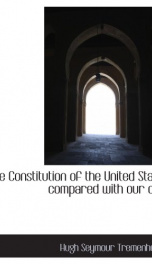the constitution of the united states compared with our own

Purchase of this book includes free trial access to www.million-books.com where you can read more than a million books for free. This is an OCR edition with typos. Excerpt from book: CHAPTER II. PROGRESS TOWARDS INDEPENDENCE. That communities, founded and nurtured as above described, should have combined to resist oppression, was no more than natural, and is a circumstance in the history of our race, at which, with Lord Chatham, "in the name of our common liberties and common character, we may be permitted to rejoice," however much we may still lament the errors and prejudices which obscured the judgment of this country at that important period. The steps which gradually prepared the public mind in America for resistance, and marked their progress towards independence, require to be briefly adverted to, because theytake their origin from a time long prior to that of the ultimate cause of disagreement and separation. The favourite democratic theory of the foundation of the civil rights of the American colonists is, according to Jefferson and others holding similar extreme opinions, that they brought with them " the rights of men," of " expatriated men." There is no need to repeat the well-known refutations of this assumption, and to show that there is no foundation in reason or history for any such abstract political rights; and that no two men, generally speaking, can be found to agree in defining what they mean, and how far they may be extended. It is sufficient for the present purpose to refer to the authority of the best American lawyers, who are agreed upon resting their civil rights upon a much more definite and intelligible principle. Mr. Justice Story states the matter thus:" The universal principle (and the practice has conformed to it) has been, that the common law (of England) is our birthright and inheritance,and that our ancestors brought hither with them, on their emigration, all of it which was applicable to their situation." This al... --This text refers to an alternate Paperback edition.
Info about the book
Author:
Series:
Unknown
ISBN:
9050959555
Rating:
2.5/5 (3)Your rating:
0/5
Languge:
English
Users who have this book
Users who want this book
What readers are saying
What do you think? Write your own comment on this book!
write a commentGenre
if you like the constitution of the united states compared with our own try:
Do you want to read a book that interests you? It’s EASY!
Create an account and send a request for reading to other users on the Webpage of the book!


